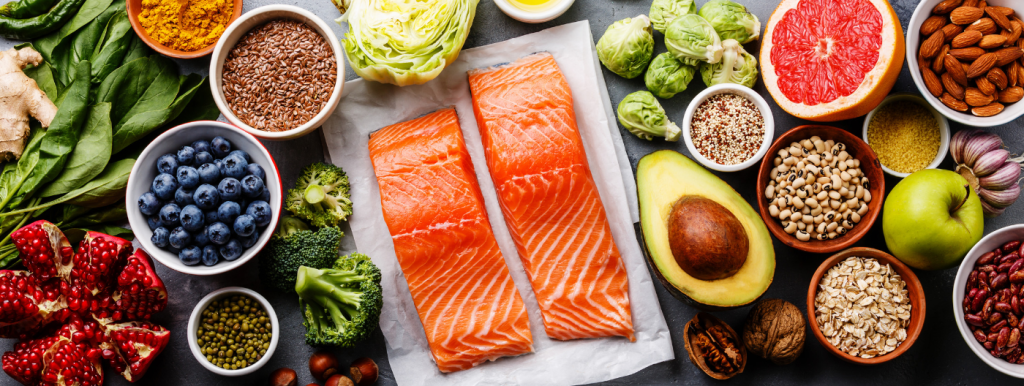An exploration of inflammation, anti-inflammatory foods, and how to incorporate more of these foods into your meals.
You are most likely aware that the food you consume impacts your long-term health. But why are some foods considered to be more healthful than others? At Enara, we don’t simply focus on ‘calories.’ The quality of your diet, the types of foods you’re including daily, are just as important as the foods you know to avoid to maintain your health.
First of all, what is inflammation? The inflammatory response is an essential biological process that promotes healing during infection, sickness, or injury. During this response, your body sends immune cells and other inflammatory compounds to the site of injury. This is an acute response that should only last several days to weeks.
However, if inflammation in the body persists, it can damage the body’s cells and eventually lead to many of the chronic health conditions prevalent today. Chronic inflammation, which is prolonged inflammation that lasts from months to years is found to be associated with heart disease, diabetes, cancer, IBD, arthritis, and other autoimmune conditions.
You may be thinking, “so what does my diet have to do with this?” One of the many ways that chronic inflammation can persist is through the types of foods/beverages we put into our body. Foods that are considered anti- inflammatory are nutrient rich foods that contain biologically active compounds (antioxidants, polyphenols) that help protect our cells from damaging inflammatory compounds prevalent in many foods, from food processing/cooking, and in our environment.
To put simply, some foods help fight inflammation in the body, and some foods promote it.
Today, we will focus on the foods to include more of to help fight inflammation. Luckily, they are the nutritious, whole-foods that we encourage here at Enara!
Below is a list of the healthiest foods in each category. Make sure you are getting a variety of these foods daily (preferably at each meal) to get the benefits of these beneficial compounds.
Anti Inflammatory Spices & Herbs
Spices:
Allspice, black pepper, cinnamon, clove, cumin, curry, garlic, mustard, nutmeg, paprika, saffron, turmeric
Herbs:
Basil, chives, cilantro, dill, mint, oregano, parsley, rosemary, sage, thyme
Color & Fiber
Non-Starchy Vegetables:
Onions, broccoli, cauliflower, brussels sprouts, dark leafy greens, fermented veggies, mushrooms, peppers, root vegetables, seaweed, summer squash, asparagus, carrots
Fruits:
Apples, bananas, berries, citrus, cherries, grapes, mangoes, melons, papayas, pineapple, peaches/plums, pomegranate, watermelon
Whole Grains:
Amaranth, barley, buckwheat, bulgar, millet, oats, quinoa, sorghum, wheat berries
Legumes:
Black beans, black eyed peas, garbanzo beans, lentils, navy beans, pinto beans, peas
Healthy Fats
Nuts:
Almonds, brazil nuts, cashews, hazelnuts, macadamia nuts, pecans, pine nuts, walnuts
Seeds:
Chia, flx, hemp, pumpkin, sunflower
Unrefined Oils:
Avocado oil, coconut oil, extra virgin olive oil, flax oil (not to be heated), hemp oil (not to be heated), walnut oil
Other fats:
Avocado, olives
Proteins
Beans/legumes, cold water fatty fish (halibut, salmon, herring, rainbow trout, sardines, tuna), eggs, fermented dairy (plain yogurt/kefir), nuts/nut butters, seeds/seed butters, whole organic soy (edamame, natto, tempeh, tofu)
Ways To Include More Anti-Inflammatory Foods:
- Add 1 tbsp ground flax or chia seeds to your oatmeal in the morning. Don’t skip the nutrient rich berries!
- Sprinkle nuts and seeds on top of salads or yogurt.
- Make a large pan of roasted vegetables every Sunday to eat throughout the week.
- Substitute a black bean burger for a hamburger.
- Drink ginger or turmeric tea in the evenings.
- Eat an Indian-style curry made with lots of turmeric.
- Eat fatty fish two nights per week.
- Incorporate “Meatless Monday” into your weekly plan.
- Eat sardines for a high protein snack.
- Try doubling or tripling the amount of spices/herbs specified in recipes.



